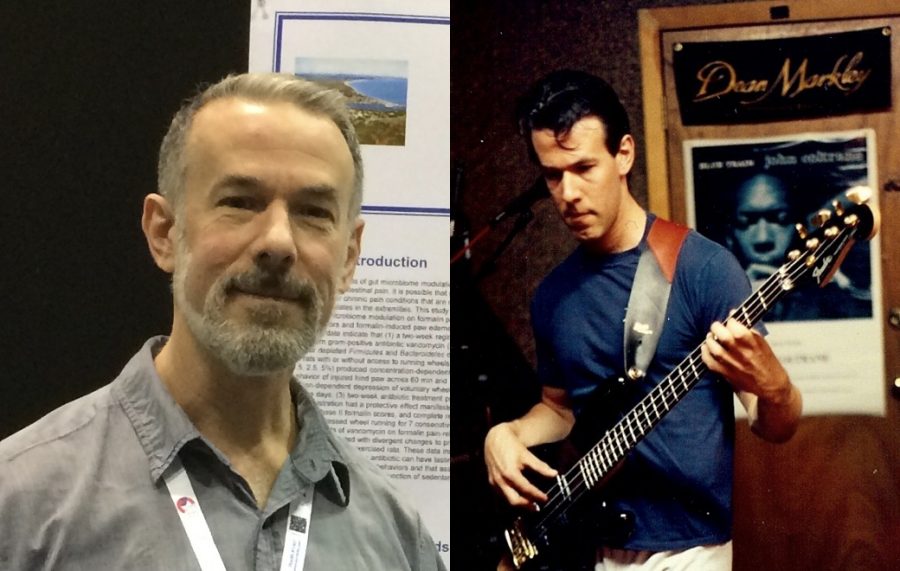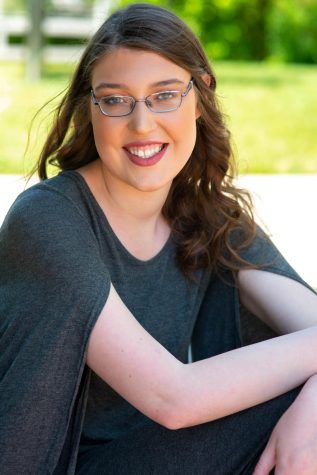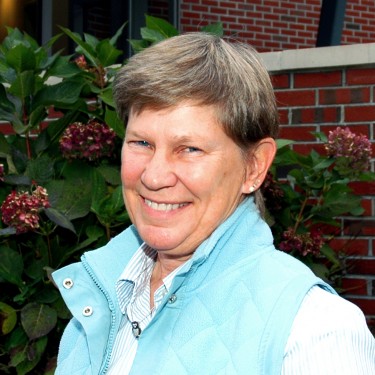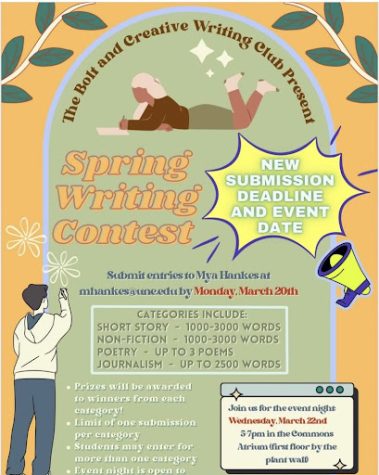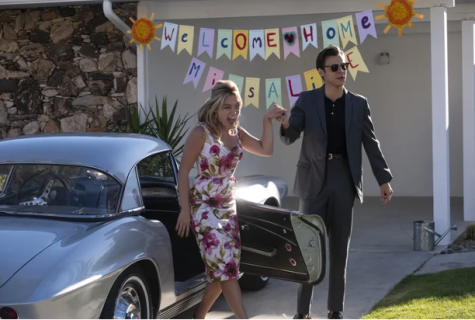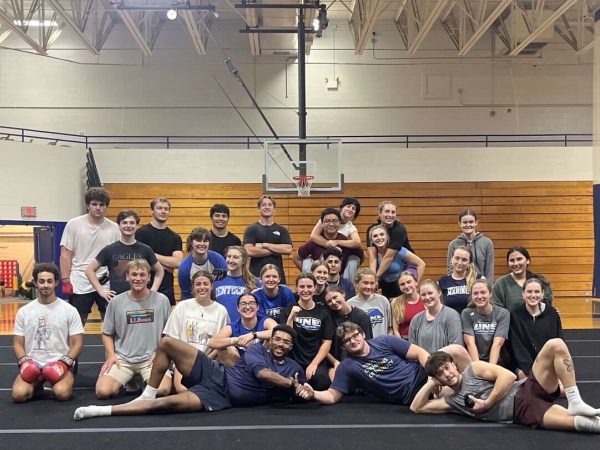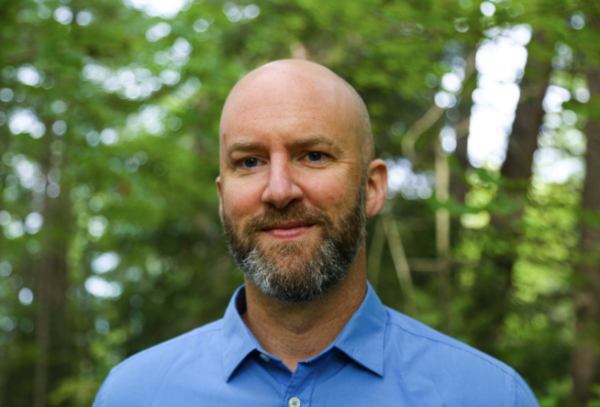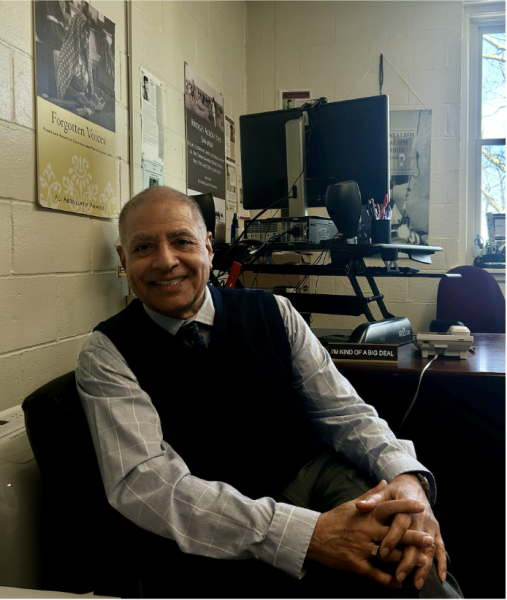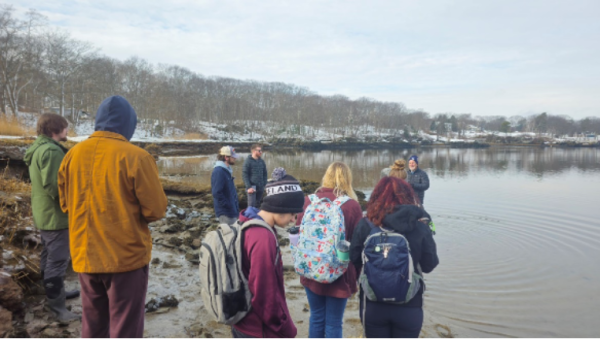Third Time’s The Charm
From music, to bartending, and finally to neuroscience, Dr. Glenn Stevenson has made priceless memories through every career change along the way.
Dr. Glenn Stevenson recounted his memories as a professional musician and head-bartender at the Bristol Lounge, Four Seasons Hotel Boston, as he smiled and shook his head. “I was in my mid to late twenties. I had this beautiful two-bedroom apartment in a converted 1920s hotel right on Comm Ave. I transformed the second bedroom into a small practice space and spent many hours in there perfecting my playing and composition. Everyone around me had real jobs, but I was totally living the dream.”
Stevenson is UNE’s neuroscience program coordinator and one of the college’s professors of psychology. He gained his knowledge with an expertise in pharmacology through American University and McLean Hospital-Harvard Medical School. Possibly what he is most known for on campus is directing his undergraduate-focused research lab. He is most proud of his undergraduate student research assistants who with him, have co-authored multiple, peer-reviewed drug discovery works as well as studies on the interactions among pain, cognition, and exercise.
Kylee Harrington is a UNE senior studying neuroscience and working as Stevenson’s research lab manager. She admired Stevenson’s hard work as she reflected on his accomplishments from the past four years. “He’s very knowledgeable, but he never admits that. He’s very humble.”
Before ultimately setting his sights on neuroscience, however, Stevenson found success following his dreams, finding “his people,” and making memories that now spark his unwavering spirit for experiencing life.
Stevenson’s band days in Boston were marked by his long black hair and hours spent in rehearsal and also at Squid Hell recording studio. He fronted the band as lead vocalist and bass player as well as played piano, keyboard, horn, and oversaw programming for synthesizers and keyboards.
His band took on two different names during its run. “The first one was Billy MulDart and His Orchestra. ‘Billy’ for William and Mary, ‘Mul’ for Muhlenberg College, and ‘Dart’ for Dartmouth. These were the colleges where the major players went,” he said with a laugh, “And then we contracted it to just, “Ed.” For the following nine years, the band simply is known as ‘Ed’ launched Stevenson into a time he would never forget.
Stevenson has fond memories of growing up in Kansas City, Missouri and then New York (where his family roots lie), spending his early life engulfed in the world of music. He was a natural from day one, and this explains why his first and only desire was to live a musician’s life.
Stevenson officially formed his band in Los Angeles along with his cousin, before moving to Boston and adding his brother, cousin-in-law, and several friends from Berklee College of Music.
Although he reminisces on those days, Stevenson admits that this career path was hard to rely on. He laments how competitive the music arena can be while trying to create a name and land big gigs. The memories of those days flashed through his mind as he remembered his bandmates. “We were really connected; it was a tremendously talented group of players with diverse backgrounds in jazz, classical and fusion all the while composing and performing a sophisticated style of progressive rock.” After releasing only one album, Ed broke up.
During his band days, Stevenson was simultaneously propelled into his second career at the Bristol Lounge where he was surrounded by actors, actresses, and 90s rock musicians. “I was the head bartender at the Four Seasons Hotel in Boston, which means that I was essentially the mayor of Boston.”
He described a feeling of power as he socialized with his clientele, and when he would visit the neighboring, award-winning restaurant, Biba. Pride shined across his face as he remembered being met at the door and handed a glass of cognac after his shifts.
At the country’s fourth best-ranked hotel in the country, Stevenson’s success peaked, and his management noticed. “Senior management approached me and said, ‘Glenn, you run a great bar. This is like the bar. This is the coolest place to be, we get it, but we want to promote you to assistant manager and track you into the management stream of this company,’ but I always said no.” Not wanting his memories at the Bristol Lounge to come to an end, he was hesitant.
“And then I decided, no joke, I wanted to do something easy. Just easier. What would be easier than music? What would be easier than the hotel industry? And I thought aha! PhD,” he said with a shockingly serious grin.
It was his mentor, Dr. Anthony Riley from American University, who had foreshadowed Stevenson’s third career. After completing his M.A. degree in Psychology in Riley’s lab, he remembers one moment in particular. “Tony walked me around his laboratory, and he looked at me and he said, ‘I want to offer you this space. This is yours if you stay and continue on to do your PhD in my lab.’” Stevenson was humbled by the offer, but refused at the time, as Riley pushed further. “He looked me in the eyes and said, ‘I expect you back in five years.’ Guess what? I came back in eight years.”
Today, Stevenson can be found in his office surrounded by cluttered stacks of papers, shelves of books, and pictures of his family. He commonly has his head buried into his laptop as he works diligently analyzing and graphing data from his undergraduate-run lab.
As Harrington reflects on the impact he’s made on her education, she reveals how Stevenson has truly become the kind of role model he once looked up to. “He’s helped me determine what I love about research and passed his passion onto me. I can say for a fact that I would not be the same person I am today if I didn’t have him as a mentor,” said Harrington.
Although Stevenson’s first two careers dominated his twenties and thirties, he is adamant that he would not trade his memories for anything. “Does it make me older in my career now? Yup. Does it mean that I was successful much later on than others? Yup. Does it mean that I am less likely to have the publications and grants I would have if I started earlier? Yup. But I don’t care I wouldn’t trade any of those great memories for more success at the Academy.”
Sometimes Stevenson misses the thriving city life, but he doesn’t plan to move back. “When I am in Maine and I’m trying to get my cellphone to work, those are the days I miss it.” He adds, “When I go to NYC to see my brother, I feel calm. It’s like homecoming. I love the congestion, the noise, and the people,” but Maine is now his home.
“Even though I might get frustrated and say, ‘This may be my third career but I’m going to start a fourth! I’m going to do something new!’ I don’t think I would ever turn my back on you guys,” he said as he gestured to me, alluding to all his undergraduate research assistants.
Although Ed will not be reuniting to make their musical comeback, and all that’s left are rumors of the legendary head-bartender of the Bristol Lounge, Stevenson is sure to keep his old memories alive while continuing to make new ones in his third career at UNE.



